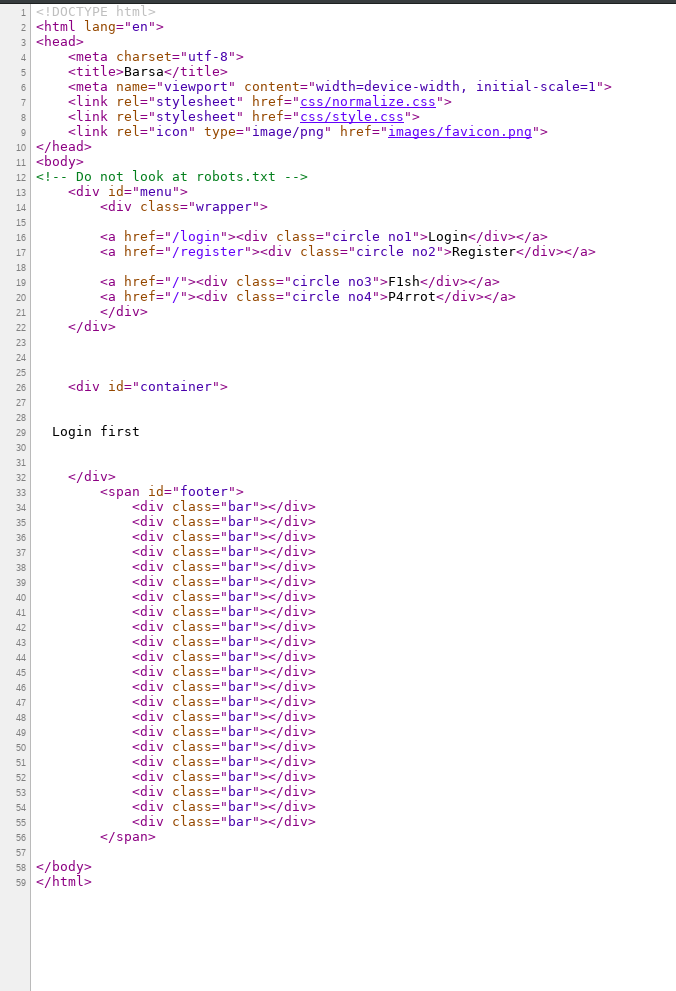JHtC4BSK barsa
20 Oct 2017Crypto ctf challenge for JHtC team.

The page have two standard functionalities: user registration and logging in. After playing with them for a while we can see that authentication is based on “auth” cookie, which contains two long numbers separated by dash. Next thing to check is html source.

After not looking at robots.txt, we do not get encrypted zip file with challenge’s source code.
src/static » unzip -l do_not_look_at_me.zip
Archive: do_not_look_at_me.zip
Length Date Time Name
--------- ---------- ----- ----
0 2017-10-10 19:32 src_tmp/
6729 2017-10-10 19:32 src_tmp/CryptoLib.pyc
6 2017-10-10 19:32 src_tmp/the_password_cant_be_and_is_not_whisky.txt
6477 2017-10-10 19:32 src_tmp/app.py
0 2017-10-10 19:32 src_tmp/static/
89 2017-10-10 19:32 src_tmp/static/robots.txt
0 2017-10-10 19:32 src_tmp/static/images/
1011600 2017-10-10 19:32 src_tmp/static/images/mp3.gif
495751 2017-10-10 19:32 src_tmp/static/images/mp4.gif
136100 2017-10-10 19:32 src_tmp/static/images/mp.jpg
735548 2017-10-10 19:32 src_tmp/static/images/flag.gif
2051627 2017-10-10 19:32 src_tmp/static/images/mp6.gif
858532 2017-10-10 19:32 src_tmp/static/images/mp5.gif
1156 2017-10-10 19:32 src_tmp/static/images/favicon.png
122004 2017-10-10 19:32 src_tmp/static/images/mp1.gif
198105 2017-10-10 19:32 src_tmp/static/images/mp7.gif
489136 2017-10-10 19:32 src_tmp/static/images/mp2.gif
0 2017-10-10 19:32 src_tmp/static/css/
5849 2017-10-10 19:32 src_tmp/static/css/style.css
7797 2017-10-10 19:32 src_tmp/static/css/normalize.css
0 2017-10-10 19:32 src_tmp/templates/
411 2017-10-10 19:32 src_tmp/templates/login.html
420 2017-10-10 19:32 src_tmp/templates/register.html
1950 2017-10-10 19:32 src_tmp/templates/layout.html
184 2017-10-10 19:32 src_tmp/templates/index.html
--------- -------
6129471 25 files
Since the password is not whisky, we do not decrypt it and… meh
After reading sources it’s clear that our task is to login as admin. It can be achieved by creating proper auth cookie of the form: E(enc_key,’admin’)–S(sig_key,sha256(E(enc_key,’admin’))), where E is pure rsa encryption function with enc_key and S is rsa signing function with sig_key
Only thing we know about enc_key and sig_key is public exponent e (equals to 65537). Let’s find theirs modules. Register two accounts (m1, m2) and get corresponding ciphertexts. Then we have:
m1**e == c1 % n
m2**e == c2 % n
m1**e - c1 == k*n
m2**e - c2 == k'*n
n ~= gcd(k*n, k'*n) == gcd(m1**e - c1, m2**e - c2)
n is enc_key modulus. Note that after computing gcd of two values, we may get z*n, where z should be small, not exactly n. We can try gcd with another plain/cipher pair or trivial division until we find exact value.
For sig_key modulus we do similarly (it will take longer to compute it though):
s1**e - sha256(c1) == k2*n2
s2**e - sha256(c2) == k2'*n2
n2 ~= gcd(s1**e - sha256(c1), s2**e - sha256(c2))
Now we can easily compute first part of the cookie. For the second one, we need sig_key private exponent. If we look at key generation function, we can notice that it’s a bit strange. Actually, it is a backdoored version of rsa key generation (for details see https://eprint.iacr.org/2002/183.pdf)
Algorithm:
seed = 476283116406539741845175463956657874046958850596520333086272652099928678076182181180321 # backdoor_modulus
k = 1024
e = 65537
e_backdoor = 17
while True:
p = random_nbit_prime(k/2)
if gcd(e, p-1) == 1 and int(bin(p)[:k/4+32],2) < seed:
break
qv = random_nbit_prime(k/2)
nv = p*qv
t = bin(nv)[:k/8]
u = bin(pi(seed, int(bin(p)[:k/4+32],2)))
u = '0'*(k/4+32 - len(u)) + u
l = bin(nv)[-(5*k)/8 + 32:]
n = int(t + u + l, 2)
q = n/p + 1 - ((n/p)%2)
while gcd(e, q-1) > 1 or not is_prime(q):
m = random_nbit_integer(k/8-40)
m += (1+(m%2)) / 2
q = q^m
n = p*q
d = modinv(e, (p-1)*(n/p-1))
Some bits on n equals to encrypted most significant bits of p. More precisely:
bin(n)[k/8:(3*k)/8 + 32] == bin(pi(int(bin(p)[:288],2)))
where pi(x) = pow(x, e_backdoor, seed)
pi funtion encrypts 288 msb of sig_key’s p.
Only way we can decrypt it, is by finding backoor’s private key, so finding factorization of seed. We can use variety of methods and most of them should quickly find, that seed is a square number. So we compute d_backdoor and msb of p.
Now, according to Coppersmith’s theorem (section 4.5), we can recover whole p and so whole sig_key
Finally, create cookie and get the flag. Full scripts below.
solve.py
#!/usr/bin/env python
import requests
from gmpy import gcd, invert, mpz, sqrt
from hashlib import sha256
from random import randint
import subprocess
print "Start"
url = 'http://jhtc4bsk.jhtc.pl:30902/'
seed = 476283116406539741845175463956657874046958850596520333086272652099928678076182181180321
e = 65537
enc_key = {}
sig_key = {}
#get keys modules
m = {}
auth = {}
c = {}
s = {}
c_hash = {}
for x in xrange(3):
m[x] = 'gros23_huehue'+str(x)+str(randint(1,10000)) #have to be unique
password = 'trolololo'
auth[x] = requests.post(url+'register', data={'username':m[x], 'password':password}).cookies['auth']
m[x] = mpz(m[x].encode('hex'), 16)
c[x], s[x] = auth[x].split('--')
c_hash[x] = mpz(sha256(c[x].decode('hex')).hexdigest(), 16)
c[x] = mpz(c[x], 16)
s[x] = mpz(s[x], 16)
enc_key['n'] = gcd(gcd(pow(m[1], e) - c[1], pow(m[2], e) - c[2]), pow(m[0], e) - c[0])
print "Encryption key modulus:", enc_key['n']
sig_key['n'] = gcd(gcd(pow(s[1], e) - c_hash[1], pow(s[2], e) - c_hash[2]), pow(s[0], e)- c_hash[0])
print "Signin key modulus:", sig_key['n']
#get private key of backdoor, seed == backdoor_modulus
e_backdoor = 17
p_backdoor = sqrt(seed)
d_backdoor = invert(e_backdoor,(p_backdoor-1)*p_backdoor)
#get 288 most significant bits of p
k = 1024
p_msb = bin(sig_key['n'])[2:][k/8:(3*k)/8 + 32]
#decrypt 288 msb of p
p_msb = pow(int(p_msb,2), d_backdoor, seed)
print "Signin key 288 msb of p:", bin(p_msb)[2:]
#compute whole p
p = mpz(subprocess.check_output(['sage', './partial_p.sage', str(sig_key['n']), str(p_msb)]))
print "Signin key p:", p
assert sig_key['n']%p == 0
#compute d
q = sig_key['n'] / p
sig_key['d'] = invert(mpz(e), mpz((p-1)*(q-1)))
print "Signin key d:", sig_key['d']
#cook cookie
m = int('admin'.encode('hex'), 16)
c = pow(m, e, enc_key['n'])
c = hex(c)[2:].strip('L')
s = pow(int(sha256(c.decode('hex')).hexdigest(),16), sig_key['d'], sig_key['n'])
s = hex(s)[2:].strip('L')
admin_cookie = c+'--'+s
print "Cookie:", admin_cookie
#get flag
resp = requests.get(url, cookies={'auth': admin_cookie})
print resp.text
partial_p.sage
#!/usr/bin/env sage
import sys
if len(sys.argv) < 2:
print "Usage: ./partial_p n p_msb"
sys.exit(1)
n = Integer(sys.argv[1])
p_msb = Integer(sys.argv[2])
pbits = p_msb.nbits()
p_msb = p_msb*2^(512-pbits)
PR.<x> = PolynomialRing(Zmod(n))
f = p_msb + x
#print '{} MSB bits of p is known'.format(pbits)
x0 = f.small_roots(X=2^(512-pbits), beta=0.4)[0]
print x0 + p_msb
